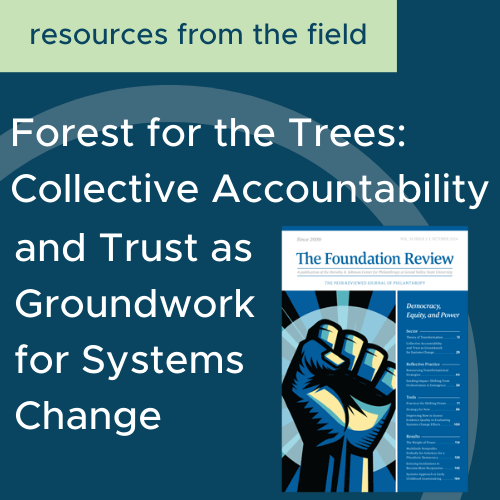
Forest for the Trees: Collective Accountability and Trust as Groundwork for Systems Change
In this Foundation Review article, Shaady Salehi and Pia Infante unpack the meaning of accountability in a trust-based philanthropy context: relational accountability—through reciprocity and trust in the funder-grantee relationship—as well as collective accountability to the communities being served.
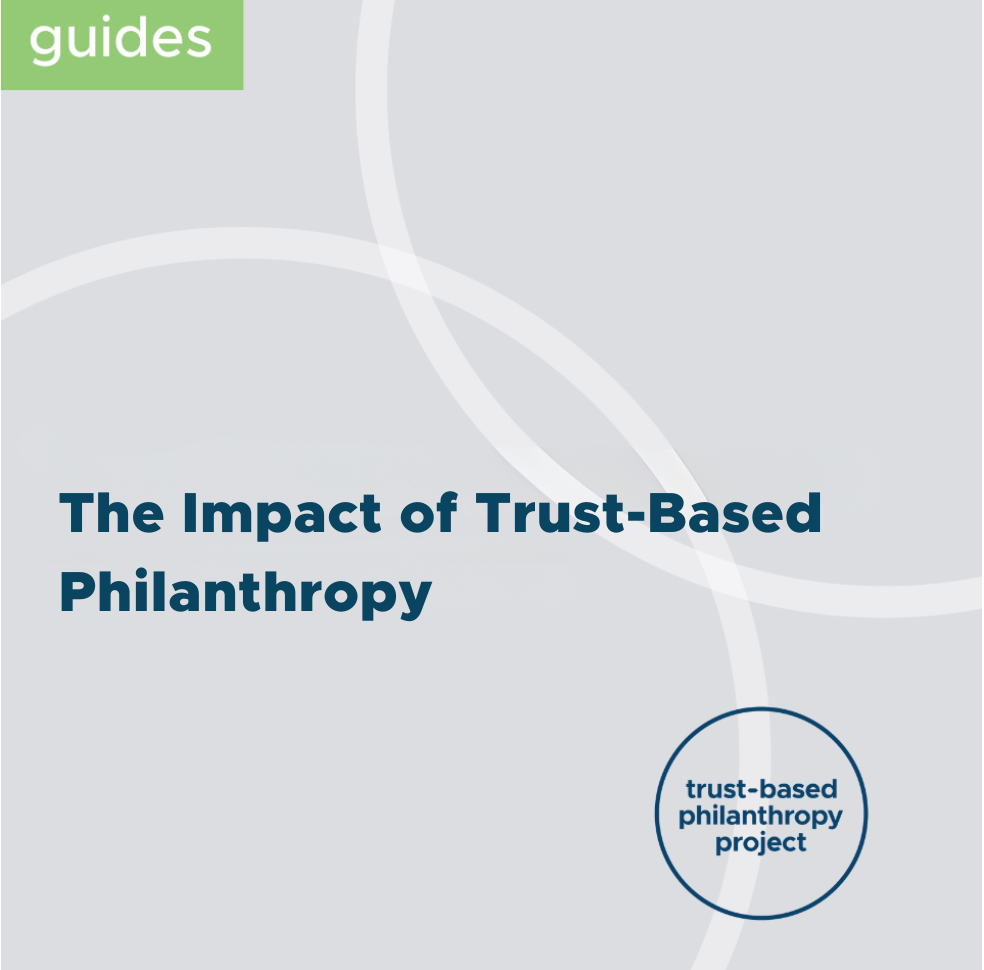
The Impact of Trust-Based Philanthropy
This guide gives an overview of the impact made possible when shifting to a trust-based approach, including impact on nonprofits, funders, communities, and the social sector. Trust-based funders are consistently seeing various opportunities for reflection, assessment, and positive outcomes–painting a bigger-picture of the positive impact on organizations and the social sector ecosphere.
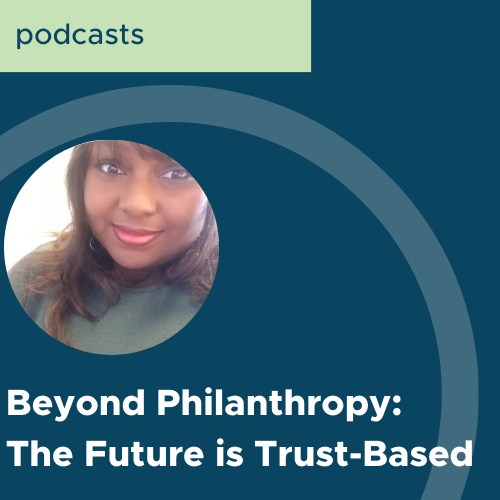
The Future is Trust-Based
Chantias Ford, Director of Programs and Strategic Learning at the Trust-Based Philanthropy Project, joins Monique Curry-Mims & Valerie Johnson on the Beyond Philanthropy Podcast to discuss the framework of Trust-Based Philanthropy, its critics, trust washing, and the future of trust in philanthropy.

Misperceptions About Trust-Based Philanthropy DEBUNKED
This guide outlines five common myths and misperceptions that come up in discussions about trust-based principles, and offers clear counterpoints in response.

Reimagining the Program Officer Role
This two-page guide, invites you to reimagine the program officer role in a radically different way - away from conventional norms of compliance and oversight, and towards trust-based norms of partnership, collaboration, and service.

What is trust-based philanthropy?
New to trust-based philanthropy? Check out this short animation that walks you through the core of what the trust-based philanthropy approach is.

210 Goodbyes: Lessons From Ending Grantee Relationships
This resource from the S.D. Bechtel Jr. Foundation provides guidance and practical steps for how to navigate the ending of a grantmaking relationship in a way that maintains your grantee partner’s needs in mind.
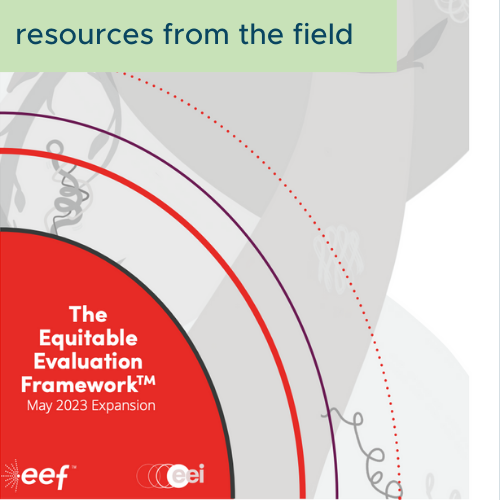
The Equitable Evaluation Framework (EEF)
This resource from the Equitable Evaluation Framework™ (EEF) provides guidance on how to align your purpose, practices, processes, and policies with your foundation’s stated values and intentions.
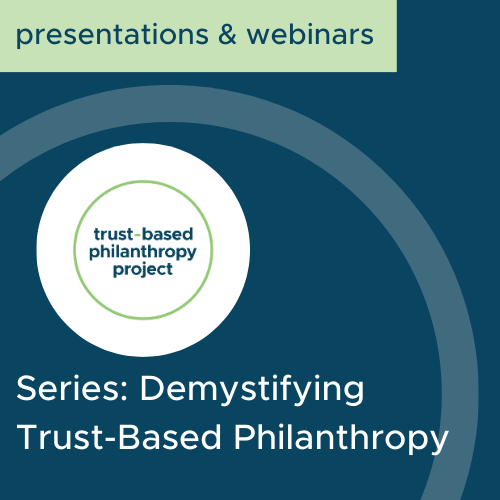
6-Part Series: Demystifying Trust-Based Philanthropy
In this six-part webinar series, the Trust-Based Philanthropy Project and featured speakers address common questions, clarify misconceptions, and explore ways to overcome obstacles in implementing trust-based philanthropy.

IVAR: Unrestricted Funding in Practice Series
These resources from UK-based IVAR provide case examples from funders who have implemented unrestricted funding practices in their organizations. Each case example provides an exploration of the impact shifting to unrestricted funding has made in their organizations, input from their grantee partners, and advice to other funders.

The Intersection of Trust-Based Philanthropy & Racial Equity
This one-pager provides a simple venn diagram of the similarities and differences between trust-based philanthropy and racial equity.
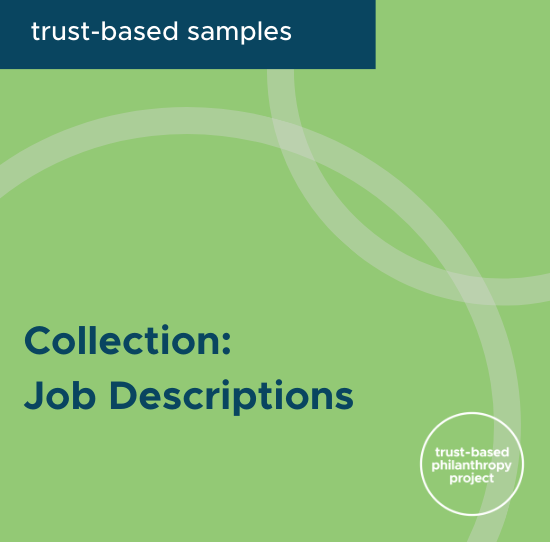
Sample Collection: Job Descriptions
These sample variety of job descriptions offer guidance for funders seeking to incorporate trust-based values in their staff roles.

Doing the Homework
This guide provides insight on what it really means to do the homework and outlines action steps funders can take to meaningfully incorporate this practice in their organizational structure, culture, and relationships.

Series: Trust-Based Philanthropy for Community Foundations
This two-part series, a partnership between the Trust-Based Philanthropy Project, Philanthropy Northwest, and the Iowa Council of Foundations, is designed for community foundations that are actively working to embrace trust-based philanthropy. This series explores how trust-based philanthropy plays out in the unique context of community foundations working at the intersection of grantmaking, fund development, donor relations, and community leadership

Support Beyond the Check
This one-pager outlines concrete steps funders can take today in their organization’s culture, structure, and leadership to support their grant partners beyond the check
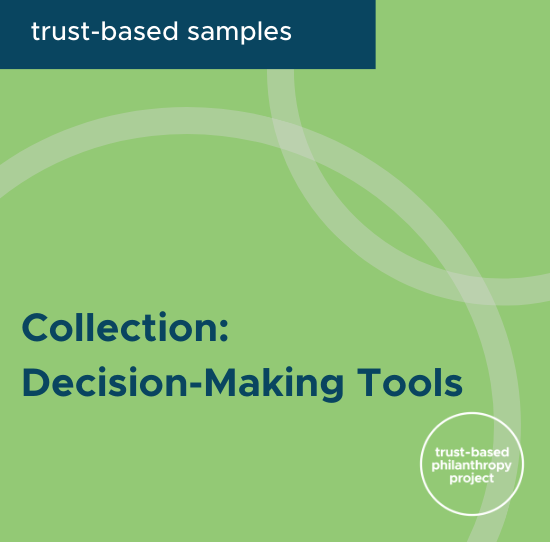
Sample Collection: Decision-Making Tools
Check out these trust-based decision-making tools designed to support the grantmaking decision process

Trustee Perspectives on Trust-Based Philanthropy
Since 2010, bi3, the philanthropic initiative of Bethesda, Inc., has invested $50 million to transform and enhance health in Greater Cincinnati. In the following videos, Bethesda Inc. Trustees Dr. Robert Collins, Ellen Katz, and Jill Miller, share about the impact of trust-based philanthropy and the role boards play in supporting their organizations on their trust-based journey.

Sample Collection: Support Beyond the Check
These examples demonstrate structured ways that funders can provide support beyond the check.
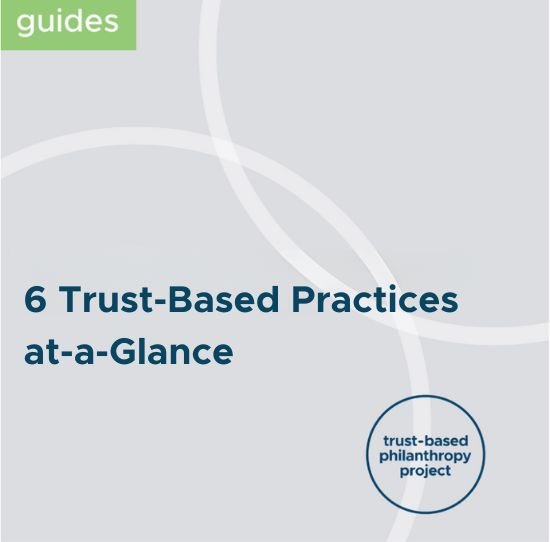
6 Trust-Based Practices at-a-Glance
This guide provides a 2-page overview of the trust-based philanthropy approach, including the six practices of trust-based grantmaking.

Trust-Based Philanthropy vs. Conventional Grantmaking
While two institutions may share the same mission, how they carry it out can vary widely. Trust-based philanthropy flips the script on conventional philanthropy by promoting a culture of sharing power, centering relationships, and fostering mutual accountability. While the two approaches are not always diametrically opposed, this overview highlights some key areas of distinction wherein trust-based philanthropy reimagines conventional norms.
